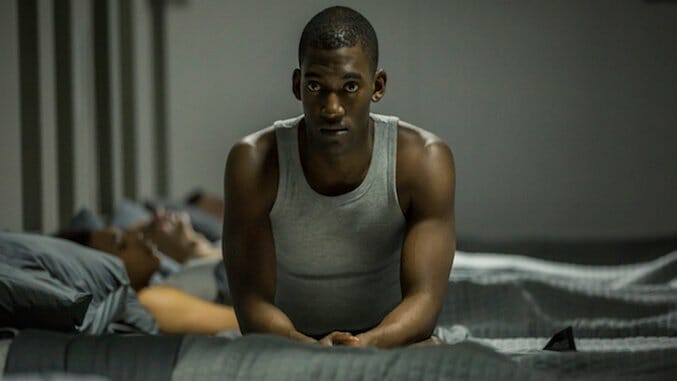Black Mirror‘s Malachi Kirby Talks Technophobia and What He Learned from Kunta Kinte
Laurie Sparham/Netflix
Malachi Kirby does not like pretending.
He admits it may be strange for an actor. But once he lands a role, he immerses himself in that character. This was the case with his turn as the Kunta Kinte in the 2016 remake of Roots, which had everything to do with Kirby allowing himself to experience Kunta’s story, his pain and, most importantly, his spiritual resolve. In his previous film and TV roles, Kirby has explored many aspects of culture and identity, mainly in London. My Brother the Devil, Gone too Far! and yes, even Eastenders, offer honest and at times humorous depictions of typical London middle-class and council estate characters from various backgrounds.
Kirby is back on screen as Stripe in Black Mirror’s “Men Against Fire,” streaming on Netflix today. In the episode, from the series’ third season, Kirby and co-star Madeline Brewer (Orange is the New Black) chase frightening creatures through a futuristic world run by the military. Paste recently spoke to Kirby about the importance of Roots and Black Mirror in our current social climate.
Paste: You went immediately from the historic locations on Roots to the futuristic set of Black Mirror’s “Men Against Fire.” How did you prepare for this transition in such a small time frame?
Malachi Kirby: We had meant to finish Roots around Christmas time but ended up going into January, and because of actor’s availabilities we had to stop and postpone and we ended up coming back to it in May. Black Mirror came in between that, and when I went for the audition, I actually found everything I had been through as Kunta very useful. I just didn’t know how to not give it to my character, Stripe, in Black Mirror. I was very full, if that makes sense. I was very tired but I was very full, just of stuff to give, I guess. This wasn’t on the script, something else happened in the [audition] room that wasn’t planned in my mind, it was just this energy I was still carrying. There were a lot of things that were helpful about what I had taken on for Kunta that I could use for Stripe. They both have their own fight.
Paste: You’re not really into all the things the cool kids are into these days—Snapchat, Twitter, etc. Is [Black Mirror executive producer] Charlie Brooker’s technophobia something you can relate to?
Kirby: [Laughs] Yeah. I mean, I love Charlie Brooker, I’ve watched all of Black Mirror. I was a fan of the series before I knew I was being cast for it. In fact, when I was auditioning for it, one of my worries was, literally, ‘Oh, no, if I get the part I’m going to find out what happens and I want to just be able to watch it like everyone else!’ I really do love the show and I find it very important subject matter. His work has always been very timely and relevant, scarily relevant. Although sometimes it may feel very far-fetched and abstract, there’s always this thing that goes ‘This could actually happen’ and that’s, I think, the scary thing about what he’s doing. As crazy as it is, it could happen.
Paste: Which Black Mirror episode has had the most impact on you so far?
Kirby: There was one episode with Daniel Kaluuya, “Fifteen Million Merits,” that I found very interesting. He gives this incredible speech at the end which really touched me. That episode had the most impact on me. But yeah, there’s something to take away from pretty much all of them. I read some sentence the other day about how you should watch Black Mirror and it’s basically saying that it’s not one of those shows that you should make the mistake of bingeing on. You really have to watch one episode a day, or maybe a week, and just digest it and think about what you saw and what it actually means.
Paste: This is something that struck me with “Men Against Fire”—you only really start understanding what’s happening halfway through the episode.
Kirby: I read the script and went into the experience similar to how you were watching it. You have all these twists and turns, which is why Brooker keeps things all secret. It’s one of those stories that unravels as you’re going along. And the journey is so exciting, but it’s how it speaks to you about what’s happening today, it’s almost not a metaphor, you know? It’s just terrifying…
-

-

-

-

-

-

-

-

-

-

-

-

-

-

-

-

-

-

-

-

-

-

-

-

-

-

-

-

-

-

-

-

-

-

-

-

-

-

-

-








































